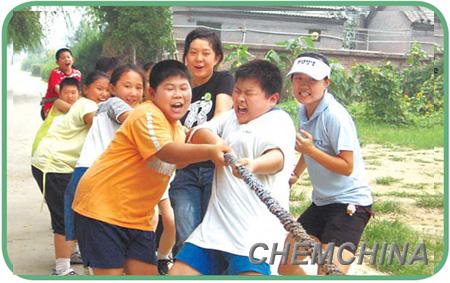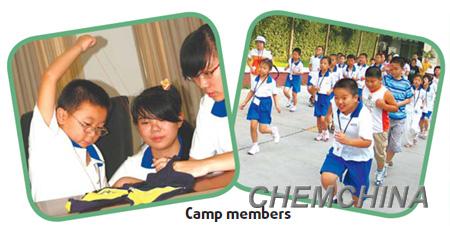
back in the summer of 1989, the china national bluestar (group) co ltd held its very first summer camp for the children of its employees. just 11 took part. now, 20 years later, the chemical processing company's annual jamboree for the most junior members of the bluestar family is a huge undertaking, spanning three continents and welcoming more than a thousand children every summer.
this year the event, beginning on july 10, celebrates the initiative's 20th anniversary and is set to be larger, bolder and better resourced than ever before. in line with the commemorative feel of the event, this year's theme is: "bluestar, our common home."
since 1992, each of the summer events has adopted an overall theme. in 1993 the theme was environmental protection, whilst in 2001 activities at the camp centered round the topic of "enhancing traditional chinese virtues."
in the two decades since bluestar, a specialist subsidiary of the chemchina group corporation, launched the initiative, the summer camp has become an integral part of the company's commitment to building its corporate culture. this stems from the company's belief that, whilst management and employees have been the traditional focus for corporate culture development, broader family-wide initiatives have often been ignored.
founding doctrine
the founding doctrine of the summer camp was quite simple and was intended to help staff working away from home and take care of their children during the summer vacation.
this saw bluestar organize a seven-day tour of gansu province in july 1990, the company's very first summer event. since those first tentative steps, bluestar has continually sought to develop the summer camp as more and more professional, as well as more and more appealing to the growing number of children seeking to take part.
the year 1999 marked a major turning point for the summer camp. despite the success of its first decade, bluestar's management decided to upgrade the activities at the event in line with the expectation and needs of a new generation of children. as well as its core activities of touring and sightseeing, the management added a whole new raft of educational and training opportunities. this saw the options of sports competitions, art exhibitions, military training and farmwork all on offer for the first time.
to coincide with these changes, bluestar invited experts from the beijing municipal commission of education to draw up a curriculum for the summer camp. it also invited leading teachers from some of the country's most well-thought schools to head up the summer camp, employed university students as teaching assistants and brought in qualified doctors to give healthcare support.
internationalization
in line with the growth of bluestar itself, the scale of the summer camp has expanded enormously. the number of campers has grown every year - from 11 in 1990 to more than 1,000 in 2007.
the number of campsites has also increased. as a large-scale state-owned enterprise, bluestar co now has more than 30 subsidiaries and scientific research institutes across the country. inevitably, the bluestar summer camp has now spawned its own offspring across china. the initiative has now also gone global, due to bluestar's acquisition of a number of overseas businesses - including its 2006 takeovers of two french companies, adisseo and rhodia, and its ownership of qenos in australia. as of 2007, it also acquired a uk subsidiary.
in light of this rapid expansion, the 2009 bluestar summer camp will be extended to include its four overseas subsidiaries. a number of the children of overseas staff will come to beijing for the summer camp, whilst bluestar will also be holding summer camps closer to its subsidiaries.
goals and benefits
according to its organizers, the bluestar summer camp now has three distinct aims. firstly its new curriculum has been designed to promote patriotic education and collectivism, whilst its secondary agenda is to distil a sense of bluestar culture and provide a sense of the company's identity among the younger generation. as a third component, but an equally important one, the summer camps also set out to provide all around education and promote personal growth.
with 20 years of experience, the bluestar summer camp and its staff have developed a number of effective management processes, all in line with the three goals outlined above.
in terms of the children and their parents, the summer camp has sought to bring considerable benefit to them. whilst the implementation of the one-child policy has sometimes been regarded as creating a generation that might be selfish or weak, the collective life in the summer camp has been seen as an effective counterbalance to this potential problem. it has also given parents the opportunity to relax and focus on their jobs.
in terms of the company - or the "big family" as it likes to term itself - the summer camp is part of a long-term strategy of investing in talent. the management believes that many of the children who have grown up and enjoyed the camps will be imbued both with a sense of patriotism and an understanding of the bluestar culture. it is among their number that it hopes to recruit the next generation of bluestar staff.
by song ping (china daily 07/10/2009 page 15)
